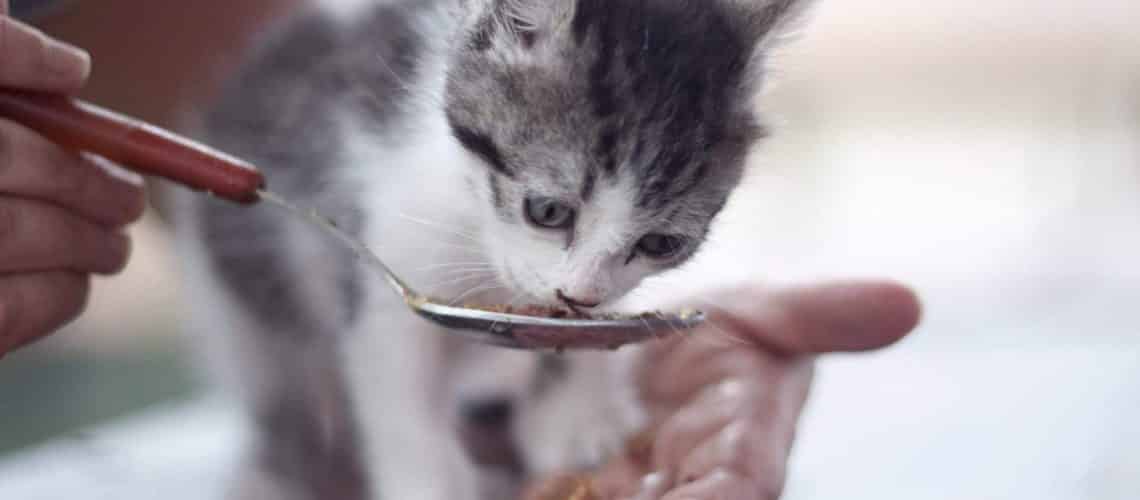
The Do’s and Don’ts of Feeding Your Cat
What your cat eats will have a big impact on their overall health, so it is good to become familiar with the foods that are recommended. It is also equally important to be aware of the foods that can be harmful to your little fur baby.
Stick to Cat Food!
You may be tempted to feed your cat table scraps or special treats, but you need to bear in mind that certain foods can be poisonous to cats. In addition, human food doesn’t provide the balanced diet that cat food does and can take away your cat’s appetite for their regular meals which provide the essential nutrients they need.
Ok, let’s be honest, a sliver of turkey or chicken from your dinner plate certainly won’t kill your cat, but you’re helping it develop bad habits. So the next time your cat begs you for a little of what you’re eating, you have to be strong, resist their feline charms, and stick to cat food!
Feeding a good quality complete commercial cat food (tins, sachets, or dry food) that is appropriate for your cat’s life stage and health status should ensure your cat gets all the nutrition they need.
And don’t worry, even though there is a huge range of cat food to choose from, your cat will soon let you know which brands and flavours they like best! It’s also important to vary your cat’s diet, as eating the same cat food day in day out can result in them getting bored and worse still, slinking over the fence to the neighbours who may have something more interesting on offer.
Foods Your Cat Should Never Eat
So having selected a cat food your cat enjoys, it’s worth remembering the everyday nasties that are unsafe for cats to eat or come into contact with. Some of these include the following foods:
Milk, cheese, and other dairy products – Many of us grew up with the image of kittens and cats drinking milk or cream. Actually, too much milk can cause diarrhea in cats, and it’s certainly not a source of the complete nutrition your cat needs.
Chocolate – As with dogs, chocolate is poisonous for cats. It can cause heart problems, kidney failure, and/or seizures.
Raw eggs, raw meat, or raw fish – These foods can cause vomiting, diarrhea or a painful condition caused pancreatitis and there is also a risk of Salmonella or E.coli associated with these foods.
Onions and garlic – Can cause an unpleasant digestive upset and are best avoided.
Alcohol – Can cause severe liver and brain damage.
Coffee, tea, and energy drinks – These contain caffeine which can cause your cat to become restless, suffer from rapid breathing, heart palpitations, and muscle tremors.
Should your cat consume even small amounts of these items, it is best to act immediately and seek advice from your local vet.
Feeding Tips for Happy Mealtimes
Whatever cat food you opt for, here are some useful tips to ensure your cat enjoys mealtimes:
- Cats like to feel safe and secure when eating so place feeding bowls in quiet locations
- Cats prefer to eat little and often so if possible, serve several smaller meals throughout the day, rather than one or two larger ones
- Serve cat food at room temperature, not straight from the fridge
- Cats have a very sensitive sense of smell so serve cat food as fresh as it can be and remember to remove anything uneaten within half an hour of meals
- Clean, fresh drinking water should always be available in conjunction with cat food.
- Ensure cat food and water bowls are cleaned regularly.
- Make sure your cat’s food and water bowls are in a separate location away from their litter boxes
- Do not overfeed your cat – like the human diet, balance is all-important. Keep an eye on your cat’s weight and learn what’s normal for your cat.
Every cat is different with its own preferences with regards to when, where, and what cat food they eat, so don’t be afraid to experiment with different foods until you find the one that best suits you and your cat.
